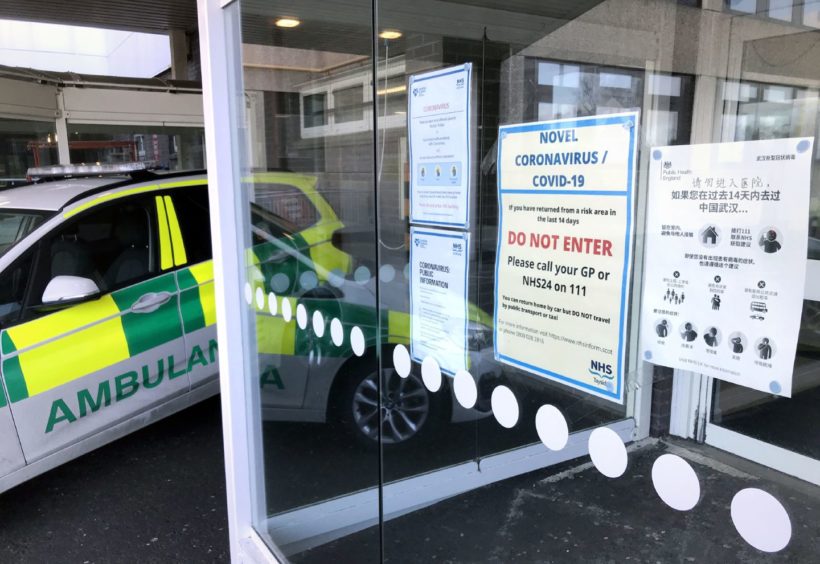NHS services in Tayside and Fife are still struggling to cope with a huge backlog of postponed operations, the latest figures reveal.
In April, Tayside carried out 36% fewer operations compared to pre-pandemic, while in Fife the figure was 27% fewer.
Although the number completed is now the highest since restrictions were introduced in March last year, critics say there are still too many for doctors to catch up with.
‘Inevitable’ backlog
Mid Scotland & Fife MSP, Dean Lockhart, says an “urgent” plan is needed.
The Scottish Conservative representative said: “NHS Fife have had to focus on tackling Covid cases over the past year but that and the restrictions put in place have inevitably led to a huge backlog of people awaiting vital treatments and procedures.
“As the situation with Covid in our hospitals has continued to improve, it is welcome to see more operations have taken place.
“However, the number across NHS Fife is still significantly lower than prior to the pandemic in February 2020.”
Many health services were suspended when the virus swept the country last year to ensure the NHS could cope with an influx of Covid-19 patients.
Although many services have been remobilised to deal with illnesses unrelated to Covid again, the backlog has created another pressure.
Difficulties in accessing GPs and screening services is also seeing early detection and diagnosis of illness fall.
Not all delays have been caused by disruption to services though.
There has also been a growing reluctance to attend appointments among patients.
1021 operations took place in April 2021 in Fife, compared to the 1407 that were carried out in February 2020.
In Tayside, 1297 operations took place in April 2021, compared to 2020 in February 2020.
The situation is mirrored nationally with April 33% lower.
Mr Lockhart added: “We must see the new Health Secretary urgently outline a plan to tackle the treatment log-jam that has built up during the pandemic.
“I will be continuing to push the SNP to commit to a one-off £600 million injection in our NHS to specifically tackle this backlog in our health service. Many of these patients cannot wait a moment longer to be seen.”
Scottish Conservative North East MSP Tess White added the SNP needs to “come up with a plan” so that people can access their right to healthcare “before it’s too late.”
‘National recovery plan’ in the works
The Scottish Government says said a clear plan will be in place in the next three months.
A spokesperson said: “The remobilisation of the NHS is one of our number one priorities and we will publish a national recovery plan for the NHS within the first 100 days of the new government.
“As the Health Secretary has made clear, the exceptional care that all NHS and social care staff have delivered throughout the pandemic and their efforts on testing and vaccinations are the bedrock on which we will build our recovery.
“The NHS has ensured that those with the most urgent needs have been treated, but we are acutely aware of the impact that the pandemic has had – that’s why we will publish a recovery plan that aims not only to restore activity to previous levels but, crucially, to exceed them.
“Staffing levels in Scotland’s NHS have reached a record high and we also plan to invest £10 billion in the NHS estate over the next five years.”
NHS ‘working very hard’ to catch up
A spokesperson for NHS Tayside said: “The impact of the pandemic on elective care services has been significant.
“However, as the number of patients requiring care for Covid-19 has reduced, our clinicians have been working hard to remobilise routine and elective services in a safe and incremental manner.
“This includes remobilising theatre capacity for elective care at Stracathro Hospital and Perth Royal Infirmary.
“As with all health boards, our waiting times have been impacted by the pandemic, however the public should be assured that our teams are working very hard to restart our services whilst also ensuring we keep our patients and staff safe.”
Volume of surgeries reduced due to safety measures
NHS Fife Director of Acute Services, Claire Dobson, added there are now many more challenges to performing operations.
She said: “Like Health Boards across the country, the Covid-19 pandemic led to fewer elective procedures being carried out in Fife last year than in previous years as we scaled back much of our elective programme to care for higher numbers of people who were critically unwell.
“As our services remobilise, we are working to minimise the time that patients wait to be seen. Significantly enhanced infection control measures are now in place in theatres which make it challenging to perform the same volume of procedures carried out prior to the pandemic, however, we continue to adapt our services with greater numbers of procedures carried out in the evenings and over weekends to ensure that we can safely maximise the numbers of procedures we carry out.
“Furthermore, we are also pioneering new procedures, such as the Rezum treatment for enlarged prostate, which enable us to increase the numbers of those in each theatre session whilst at the same time minimising the recovery time for patients.
“Patient safety remains our single biggest priority and our clinical staff continue to triage patients to ensure those with the greatest clinical need are prioritised to be seen quickly.”

